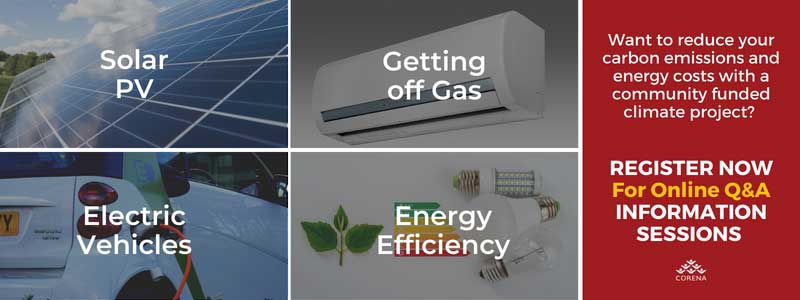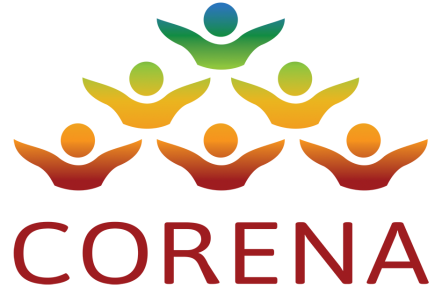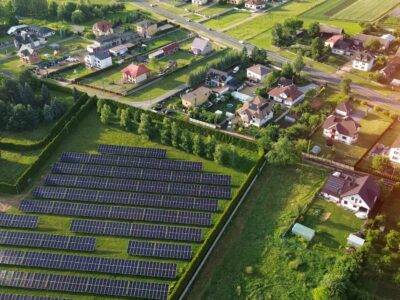While large-scale renewable projects are making headway, a quieter revolution is taking place at the grassroots level: community energy. Australia is a sunburnt country, a land of sweeping plains and abundant sunshine. It’s also a country with a growing appetite for clean energy. This movement empowers local communities to take control of their energy production and consumption, with far-reaching benefits for the environment, the economy, and social cohesion.
What is Community Energy?
Community energy projects refer to any renewable energy or efficiency initiative that is developed, owned, and operated by a community, for the benefit of that community. It’s about local people coming together to generate their own clean power, often through projects such as:
- Solar gardens: Shared solar arrays where community members can purchase or lease panels and receive a credit on their electricity bills.
- Wind farms: Community-owned wind turbines that generate clean electricity for local consumption or export to the grid.
- Community Batteries: Large scale batteries shared by local homes or businesses.
- Energy efficiency programs: Community-led initiatives to reduce energy consumption through education, retrofits, and behaviour change.
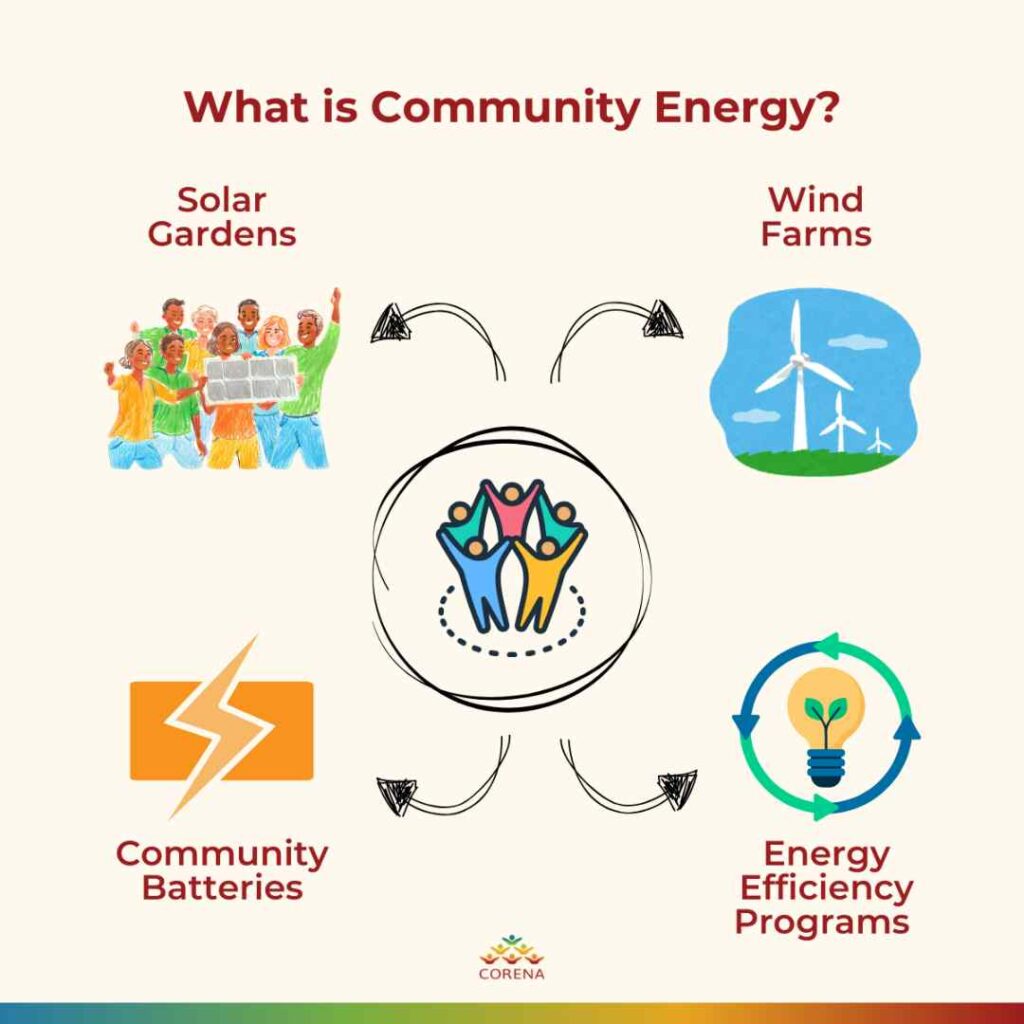
A Brief History of Community Energy in Australia
While the concept of community renewable energy is not new, it has gained significant momentum in recent years. The Hepburn Wind project in Victoria, established in 2011, is often cited as a pioneering example. This community-owned wind farm has not only generated clean electricity but also provided substantial economic benefits to the local area. Since then, many community energy projects have sprung up across Australia, driven by a desire for greater energy independence, climate action, and local economic development. Community solar investment in Australia is becoming increasingly popular, especially community solar energy projects.
Other recent examples include the Grong Grong Solar Farm, Goulburn Community Energy Cooperative and Narrabri Community Battery Trial just to name a few!
Learn more in Why Solar Panels Are A Top Renewable Energy Source
Types of Projects
Community energy projects can take many forms, depending on the needs and resources of the community. Some common models include:
- Cooperative model: Community members form a cooperative to jointly own and manage the project.
- Trust model: A trust is established to hold the assets of the project on behalf of the community.
- Company model: A company is formed to develop and operate the project, with community members holding shares.
- Embedded network model: A community establishes its own electricity network to supply renewable energy to local residents.
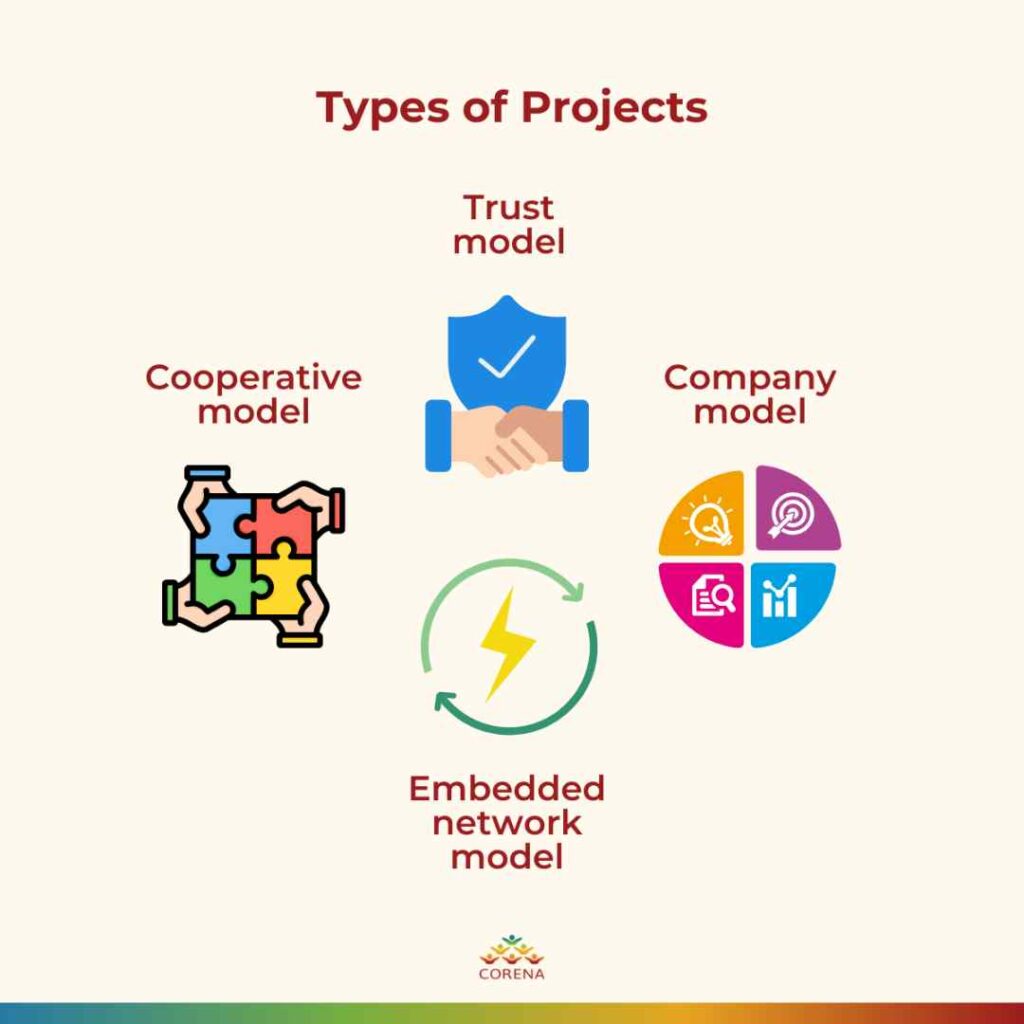
Frameworks & Features
Several organisations support the development of community energy projects in Australia:
- The Coalition for Community Energy (C4CE): The peak body in Australia, providing resources, advocacy, and networking opportunities.
- State government policies: Many states have policies and programs to encourage community renewable energy projects, including grants, rebates, and feed-in tariffs.
- Community energy retailers: These retailers specialise in selling renewable energy from community-owned projects.
- Crowdfunding platforms: These platforms allow communities to raise capital for their projects from a large number of small investors.
Benefits
Community energy projects offer a wealth of benefits:
- For communities:
- Reduced energy costs
- Increased energy independence
- Local job creation
- Improved community resilience
- Greater social cohesion
- For the environment:
- Reduced greenhouse gas emissions
- Increased use of renewable energy
- Improved air quality
- For the climate:
- Contributes to meeting national emissions reduction targets
- Supports the transition to a clean energy future
Funding Options
Community energy projects can access a range of funding options:
- Government grants and rebates: Various federal and state government programs offer financial support for community energy projects.
- Community shares and bonds: Communities can raise capital by issuing shares or bonds to local investors.
- Crowdfunding: Online platforms allow communities to raise funds from a large pool of small investors.
- Debt finance: Community energy projects can secure loans from banks or other financial institutions.
- Power purchase agreements (PPAs): Communities can sell the electricity generated by their project to local businesses or government agencies through a PPA.
Learn more in Renewable Energy Grants & Funding: What is the difference & how to apply?
How Communities Can Get Started
If your community is interested in developing a community energy project, here are some steps to get started:
- Build a core group: Gather a group of passionate individuals who are committed to driving the project forward.
- Assess your community’s needs and resources: Identify your community’s energy needs, potential renewable energy resources, and available funding options.
- Develop a project plan: Create a detailed plan outlining the project’s goals, timeline, budget, and ownership structure.
- Engage with the community: Consult with the wider community to ensure their support and participation.
- Secure funding: Explore the various funding options available and secure the necessary capital for your project.
- Develop the project: Work with experienced professionals to design, construct, and commission your community energy project.
- Operate and maintain the project: Establish a system for ongoing operation and maintenance of the project.
- Celebrate your success: Share your achievements with the community and inspire others to take action.
Learn more in Community Renewable Energy: What It is & How You Can Get Started
Resources
- Coalition for Community Energy (C4CE): https://c4ce.net.au/
- Community Power Agency: https://cpagency.org.au/
- Clean Energy Council: https://www.cleanenergycouncil.org.au/
- Renew: https://renew.org.au/
Community energy is a powerful tool for building a more sustainable and equitable energy future for Australia. By harnessing the power of community, we can create a cleaner, more resilient, and more democratic energy system that benefits everyone.
Be Part of Australia’s Community Energy Future
Here at CORENA, we provide an innovative revolving fund model that helps finance non profits and community organisations who wish to reduce their carbon footprint and improve their energy efficiency, but cannot afford the upfront expense. Our revolving fund ensures that these kinds of climate projects get the funding that they need in order to get off the ground and become part of the renewable energy transition.
We are currently investigating how we might better support community energy projects within our revolving fund model. If you have a community energy project that would benefit from a zero interest loan please get in contact.
Join Australia’s renewable energy revolution and help to finance community solar energy projects in your community by donating to our revolving fund. We play a role in supporting all kinds of community climate and renewable energy projects.
Interest Free Renewable Energy Loans For Non Profits, Community Organisations, Charities, & Social Enterprises
CORENA, can provide free technical advice and zero interest funding to qualifying organisations and communities looking to reduce their emissions and green their energy consumption.
Donations help us to provide funding to non profit and community organisations for:
- Solar Panels – the basis of your community solar energy project
- Energy Efficiency – such as switching to efficient alternatives or installing insulation
- Getting Off Gas – Replacement of fossil gas appliances with electric alternatives
- Electric Vehicles
- A combination of the above
No interest is paid on CORENA loans, and the quarterly loan repayments are set to be a little less than the savings on operating costs averaged over a year. This means never being out of pocket for upfront costs. After the loan is fully repaid, loan recipients reap the full financial benefit of having lower energy costs.
Learn more in 5 Ways CORENA Helps Non Profits Reduce Carbon Emissions & Energy Costs
To learn more, check out how to apply for a loan, or register for one of our upcoming Online Q&A Information Sessions.
